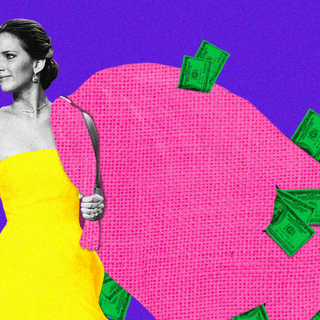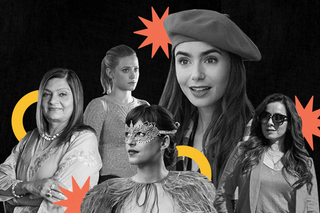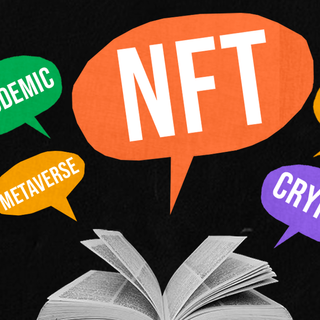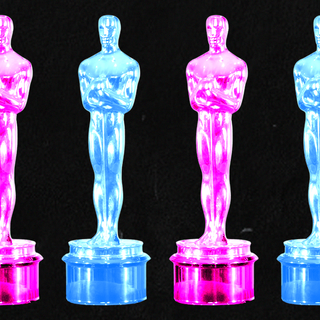
Why We Love to Hate‑Watch Things
We feel like we have to “cloak our… tastes in a layer of irony” in order to protect our street credit, researchers say.

When Emily in Paris jauntily took over screens last year, many had just one question: How can something so popular be so ferociously hated? Someone called this misplaced admiration a “global crisis.” But the genre of things people deride but still religiously watch predates Emily’s Parisian adventure. Think: reality TV shows.
People’s expectations from hate-watching are quite simple: they will enter a world of entertainment they know they will dislike and beat its incompetence to death.
Hate-watchers have slowly given new meaning to the idea of fandom. “Hate-watchers exhibit the symptoms of fandom – watching every episode, micro-analyzing it with other viewers – while still abhorring their targets on a rational level,” writer Jennifer Keishin Armstrong wrote in BBC.
In the 1940s, classical singer Florence Foster Jenkins (Meryl Streep played her in a 2016 movie) attracted crowds for her “terrible singing” and is said to have pioneered the hate-fandom trend. Similar attention also encased Fifty Shades of Grey in 2015; all the criticism about the novel having little cinematic effect went down the drain as the installment went on to become a blockbuster. It is when the “dawn of movie hate-watching” truly cemented itself. “Fifty Shades is one of the first modern examples of a big opening for a movie that people didn’t really like but came out to despite — or, again, perhaps because of — that fact,” LA Times noted.
Hate-watching also comes from a place of appreciation of the theme/premise/scope of the show. It is a world people would like to like but, on being disappointed, spend their time figuring out why they don’t.
TV critic Ryan McGee argues no one truly hate-watches something they really hate. Because if you actually hate something, you turn it off. “What they hate is the execution, not the premise, which means that hate-watching is engaging with the potency of the idea versus the potency of its reality,” he told Vox. In that, a particular show or movie fails to live up to the standards a viewer “fairly or unfairly places upon that piece of pop culture.”
But how that disappointment morphs into pleasure is the premise of hate-watching. “It’s a form of expertise, just like fandom is a form of expertise,” Joli Jensen, a media studies professor at the University of Tulsa, told BBC. “You’re getting pleasure from trying to figure out why it’s not giving you pleasure.” The whole “it’s so bad it’s good” feeling is irreplicable, it makes for a fun way to engage with shows and movies.
When a Peter Pan Live aired some years back, people’s “biggest disappointment” was that it wasn’t bad enough. “This wasn’t the kind of thing you could hate-watch. This was a meh-watch,” Jessica Goldstein noted with a sigh.
Related on The Swaddle:
Why Stories About Filthy Rich People Fascinate Us
Plus, acting like an expert on things makes people feel better about themselves. Mockery has remained a central plank of our culture; a plank only bolstered with social media. “It’s not kind, it’s not progressive – but it is human to elevate one’s own self-esteem by belittling others,” as Candid Orange Magazine noted. Moreover, there remains a curious joy in bonding with other skeptics of entertainment. What’s better than watching Riverdale? Putting it under gleeful scrutiny.
Individually, it may serve some nostalgic purpose. Something like Sex and the City may be a reminder of what people did in their 20s. It helps to feel like “home” for a bit watching re-runs of shows or movies.
Some may even argue that hate-watching doesn’t necessarily have to be a product of hostility. We may claim to hate-watch something to “protect ourselves and our street cred,” Madeleine Davies wrote in Jezebel. When something is embarrassing in its premise or execution, people feel the need to cloak their “tastes in a layer of irony.” Think, Indian Matchmaking or Fabulous Lives of Bollywood Wives.
This is also what makes hate-watching different from indulging in “guilty pleasure.” Hate is a powerful emotion, one that carries the onus of caring enough about something. But the level of expectation with guilty-watching is reasonably low. The instinct to justify watching Keeping Up With the Kardashians is that they’re pleasurable in some way; in that there is something voyeuristic about it. Or simply, schadenfreude prevails in watching other people’s misfortunes. People don’t expect much, so irrespective of the quality of work, the disappointment doesn’t translate into hate.
But is hate-watching actual criticism? McGee argues “it’s more like live-tweeting.” “Both are in-the-moment, performative reactions to a piece of pop culture that exists in parallel for a finite amount of time,” he says. That something is immediate, like more and more entertainment options on streaming platforms are, makes it easier to mock them.
Plus, criticism comes from a place of what the work is. When people hate-watch, the judgment hangs itself on what the piece isn’t and could have been. The motif, again, is a prevailing sense of disappointment.
Of course, hate-watching seems to be a vicious cycle — the more people hate something, the more popular that work of entertainment becomes. It is a marketing trick, really.
Irrespective of the result, hate-watching speaks to the complexity that lies within us. It may reveal our insecurities, expectations, or even a distorted form of hope.
In Colson Whitehead’s book, when asked why someone keeps watching shows they don’t like, a character replies: “Some days, all you have is gazing upon horror, and the small comfort of being surprised that it is not yours.”
Saumya Kalia is an Associate Editor at The Swaddle. Her journalism and writing explore issues of social justice, digital sub-cultures, media ecosystem, literature, and memory as they cut across socio-cultural periods. You can reach her at @Saumya_Kalia.
Related


A Dictionary Picked ‘NFT’ as 2021’s Word of the Year
